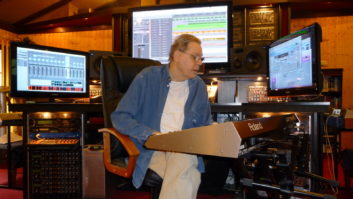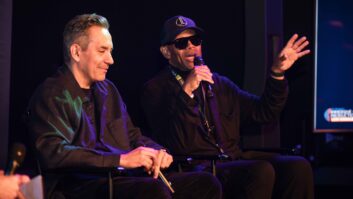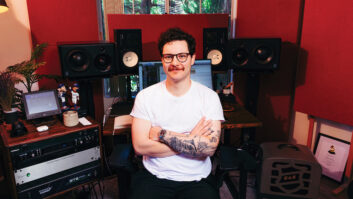The Gullah, also known as the Gullah-Geechee, are a close-knit community descended from West African slaves who have long lived on the Sea Islands and Lowcountry region of Georgia, Florida and South Carolina. Their culture and traditions are being brought to a wider audience today through the music of Ranky Tanky, a five-piece from Charleston, SC, whose 2019 release, Good Time, won a Grammy Award in the Best Regional Roots Album category.
Four members of Ranky Tanky—drummer Quentin Baxter, bassist Kevin Hamilton, guitarist and vocalist Clay Ross, and trumpeter and vocalist Charlton Singleton—first played together in a jazz band after college. They got back together in 2016 and recruited vocalist Quiana Parler, a former American Idol contestant and one of three band members with Gullah family ties.
Music, Etc.: Gloria Gaynor — Surviving, Thriving and Testifying
The band’s jazz- and gospel-inflected interpretations of the centuries-old music, poems, games and children’s songs of their ancestors have obviously struck a chord with fans. Their debut album, Ranky Tanky (which loosely means “get funky”), went to #1 on Billboard’s Jazz and Contemporary Jazz album charts. Appearances and performances on nationally syndicated radio and NBC’s The Today Show followed.
The band’s sophomore album, Good Time, was produced at Truphonic Recording Studios in Charleston and was mastered by Vlado Meller. It debuted at #2 on the Billboard Jazz chart in July 2019.
Gullah music probably first entered the national consciousness in the early 1960s, when ethnomusicologist and archivist Alan Lomax recorded singer Bessie Jones. She went on to record and perform at Carnegie Hall and the Newport Folk Festival (one of her recordings was sampled by Moby on “Honey,” the lead single from his 1998 Play album). But as Charlton Singleton explained to Pro Sound News, the Gullah tradition doesn’t just inform Ranky Tanky’s songs but music at large.
On the influence of Gullah culture:
Gullah has been around for so long, it’s definitely an informant to a lot of other musical genres. If you were to go to a number of different places, especially in the South, where you have arguably the birthplace of jazz, and the birthplace of folk music in the Appalachian Mountains, there are certain similarities in the sounds of those places. They have direct ties to the Gullah community and West African music.
You had this group of people living on these islands before anybody came up with jazz in the late 1890s, or folk or rock ’n’ roll or gospel. All of that came after the Gullah community was born. That’s why we talk about it being an informant to so many different styles.
The best person to describe how it all connects is probably Quentin, our drummer. Sometimes when Quentin explains it and taps out or sings a Gullah rhythm and talks about how it has infused into another style of music that we’ve come to know as blues or gospel or jazz, you go, “Wow, I never heard it that way.”
It goes further than that. Clay always talks about his time playing in Cyro Baptista’s Beat the Donkey band and going to Brazil and hearing the music there. Clay said, “That sounds like Quentin playing at church.”
On the pioneering work of Bessie Jones
She, along with Alan Lomax, brought a lot of material to the forefront so that everybody could experience it. The material from our first recording is nothing but Gullah standards, as we call them. You can find a lot of recordings of those tunes from various sources, but Bessie Jones and her book, Step It Down, is something that we referred to quite a bit, especially when we were starting this band.
On the production team
Rob Macomber was the lead engineer. He works with Jazz at Lincoln Center and mixes a lot of live recordings there. Elliott Elsey assisted.
Quentin was the producer. He and Rob worked on a number of projects together. Quentin has produced an album for me, and he’s produced for a number of other musicians in the Charleston area. He produced a record for Grammy-nominated jazz vocalist René Marie. When we decided to look for a producer, it was a no-brainer to look right next to us in the band.
Before we even walked into the studio, Quentin sat us down one by one and talked with us about what we wanted to hear and how we wanted it to come through for our personal instrument. He was very meticulous. It was fun to be in the studio with his ideas. Quentin made it all so easy.
We’re excited to be reaping the benefits of his masterful production skills.
On recording at Truphonic
They have a really nice setup, and they’re very quick and thorough. It has been a joy to work with them. Anytime you’re in a studio situation where you’ve got quality people who know what they’re doing and are all-in on the project, you can just come in and be the artist and not worry about other stuff.
We’d been playing these songs at shows, so by the time we got to the studio, it was just a matter of tweaking something here or there. There were very few overdubs. There were some fixes, but pretty much all the rhythm tracks were just one or two takes.
And Vlado, who is legendary, has his mastering room there. His resumé is a who’s who of music.
On Ranky Tanky’s biggest boosters:
We appreciate the support, especially from the local community and the Gullah community, and the encouragement and well-wishes that they have given us. And not just as Ranky Tanky but individually, all through the years. The “village” has been around us since day one and we feel blessed to have this sort of support and encouragement from them.
Ranky Tanky • https://www.rankytanky.com







